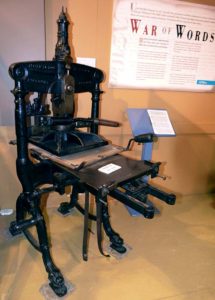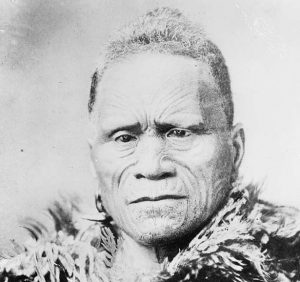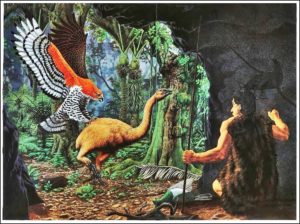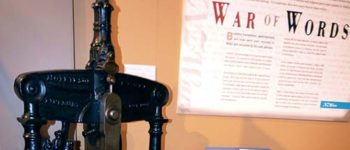1863: The Sparrow and the Eagle
December 31, 2020
By AHNZ
 In the Waikato of 1863 there was competition in the newsprint media market for the Maori reader. In short, one paper was called The Eagle and the other The Sparrow. The contest of ideas ended when affiliates of the former newspaper came to kill the editor. Sacked the offices.
In the Waikato of 1863 there was competition in the newsprint media market for the Maori reader. In short, one paper was called The Eagle and the other The Sparrow. The contest of ideas ended when affiliates of the former newspaper came to kill the editor. Sacked the offices.
‘The Eage’, or Te Hokioi, was the print media of Matutaera Tawhiao (Maori King 2.0) and his administration. They had high ambitions to be self-governing. They had been loyal subjects of The Crown but now they either had cold feet or else had been duplicitous all along.
 ‘The Sparrow’, or Lone Sparrow, Te Pihoihoi Mokemoke, was created by the other faction to be their print media. The first edition was published on 2 February 1863 but it only made it to 23 March before Ngati Maniapoto warriors trashed it. This was one of the acts of war that lead to the Waikato War.
‘The Sparrow’, or Lone Sparrow, Te Pihoihoi Mokemoke, was created by the other faction to be their print media. The first edition was published on 2 February 1863 but it only made it to 23 March before Ngati Maniapoto warriors trashed it. This was one of the acts of war that lead to the Waikato War.
 Hokioi is a great name for an apex predator, the legendary eagle that made humans its victims. It was also based on a real bird, probably Haast’s Eagle. In breaking the media monopoly, The Sparrow was offering a contrasting point of view. Their title came from Psalm 102, an ancient Slave Culture litany of humbleness and even neutrality. However, it could hardly have been more neutral than it’s competitor since this too was the newspaper of a government. It was edited by a government man, John Gorst, and funded by the Colonial Government.
Hokioi is a great name for an apex predator, the legendary eagle that made humans its victims. It was also based on a real bird, probably Haast’s Eagle. In breaking the media monopoly, The Sparrow was offering a contrasting point of view. Their title came from Psalm 102, an ancient Slave Culture litany of humbleness and even neutrality. However, it could hardly have been more neutral than it’s competitor since this too was the newspaper of a government. It was edited by a government man, John Gorst, and funded by the Colonial Government.
“…chief Rewi Maniapoto of the Ngati Maniapoto tribe and his warriors attempted to kill Gorst. As Gorst was forewarned they made do by destroying the trade school, destroying a printing press and scaring all the settlers out of the Waikato where they had lived peacefully since 1830. This incident and the ambush and killing of British troops walking along a beach near New Plymouth, led to a restart of the war between the Maori King Movement and the New Zealand government in 1863.”- Wiki
Rewi Maniapoto was a hot-head, and chiefly responsible for starting the Waikato War according to Gorst (understandable given his close shave.) My own view is that Tamati Ngapora is the individual most to blame for defecting to the rebel state. Like a back-seat driver, Rewi could afford to be opinionated and bloodthirsty on behalf of greater Waikato because his turf was deep in the backblocks. He wasn’t front-facing to the colonists so egged on the awakening of the Saxon’s Wrath. Besides, Ngapora and Maniapoto were both playing into the hands of Government men who were only to glad to have a war. Statism thrives on it.
“After only four issues of the government paper it ceased abruptly. Rewi Maniapoto of Ngati Maniapoto, confiscated the Pihoihoi press and its fifth issue. The government press – along with its editor – was shipped back to Auckland.”- Te Hokioi a Rere Atu Na! The Hokioi Press; Te Awamutu Museum
“After a series of heated exchanges between the two publications, the government newspaper’s printing press was seized by a Ngāti Maniapoto group in March 1863.”- Te Ara, government history page
So, I guess the Maori King Movement wasn’t big on freedom of the press. What the warriors did was violent destruction, armed robbery at best. It’s typical of State history these days that this would be minimised. Te Awamutu museum calls it ‘confiscation’ and Te Ara ‘seizure’ as if Rewi had the right and they leave out the violent nature of the attack. No wonder there are people who can believe the Waikato War was an out-of-the-blue outburst of paranoid aggression from Auckland when such important background history as this is redacted or sidelined.
—
Image ref. Printing press for Te Pihoihoi Mokemoke (‘A Sparrow Alone’) at Te Awamutu Museum; Alexander Turnbull Library; Te Ara
 Like Comment Share
Like Comment Share






One thought on "1863: The Sparrow and the Eagle"